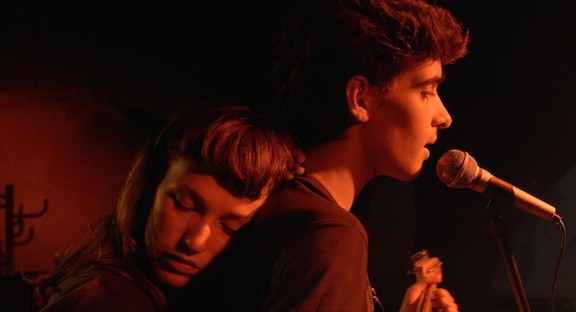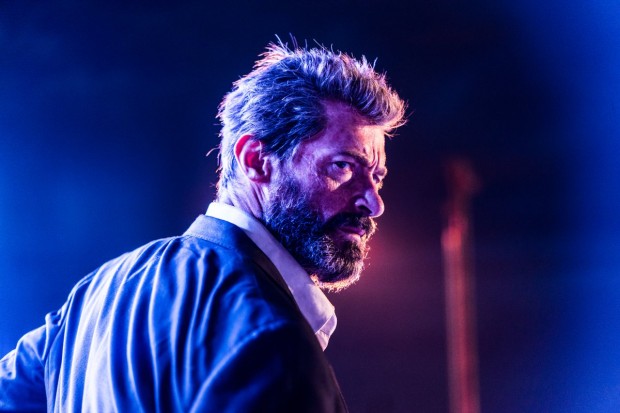
With the 2017 Berlin International Film Festival wrapped, we’ve highlighted our favorite films from the festival. Make sure to stay tuned in the coming months as we learn about distribution news for the titles. Check out our favorites below, followed by our complete coverage, and one can see the winners here.
Ana, mon amour (Cãlin Peter Netzer)

We only hurt the ones we love, or at least it seems that seems to be the norm in Cãlin Peter Netzer’s latest film, a cerebral examination of love in decay that appears to be the Romanian New Wave’s (if we can still call that) answer to Derek Cianfrance’s Blue Valentine. Romping, eroding, and unraveling over the course of about a decade or so, Ana, mon amour (Netzer’s first film since winning the Golden Bear back in 2013 for Child’s Pose) concerns itself with the doomed romance of Tomo (Mircea Postelnicu) and Ana (Diana Cavallioti) from their very first sexual encounter (self consciously talking philosophy in their university dorm room before taking things up a notch) to marriage, child birth, and ultimately, disaster. – Rory O. (full review)
Close-Knit (Naoko Ogigami)

If the direct emotion pull and inclusive vibe of Naoko Ogigami’s Close-Knit could be expressed in a single scene it would perhaps be the moment early (Ogigami’s only use of flashback) when a central character named Rinko (played by Tomo Ikuta) remembers the day when she came home from school to find that her mother had bought Rinko her first bra and knitted her some fake boobs. We learn that some students had been bullying and body-shaming Rinko in P.E. class and so understandably (and adorably) her mother wanted to help her get through it. Like much of the film, it’s a basic enough scene: classy without the need for flash; simply shot in crisp natural light; unmistakably sentimental but with an earnest and playfully subversive undercurrent of humor running through. The rub here is that Rinko was not born a woman and is struggling with her transition. Thus, the great warmth of her mother’s gesture is further enhanced by the fact that she has chosen to accept, embrace and, yes, love her child for who she really is. – Rory O. (full review)
Colo (Teresa Villaverde)

Along came Colo, another Portuguese arthouse offering with a capital A set against the backdrop of the country’s economic recession. It’s not only the longest film in competition at this year’s Berlinale but also its most obstinately enigmatic. As with Arabian Nights, traditional storytelling is stripped to a bare minimum here. The way writer/director Teresa Villaverde plays with suggestion and symbolism, however, proves immensely seductive, leaving one teased, provoked, blissfully mystified. – Zhuo-Ning Su (full review)
A Fantastic Woman (Sebastián Lelio)

Chilean director Sebastián Lelio’s follow-up to his 2013 hit Gloria is a dazzling companion piece that once again focuses on a woman’s resilience in a world where what doesn’t kill you doesn’t necessarily make you stronger. Timely issues of transgender rights both in Latin and North America help make A Fantastic Woman a bolder, brasher film, fiery in comparison with Gloria’s relatively tenderness, but anchored once more by a stellar central performance. Gloria’s Paulina Garcia won the Berlinale’s Best Actress award here four years ago, and trans actress Daniela Vega could repeat the feat in what would be a watershed moment for mainstream cinema’s treatment of transgender actors. – Ed F. (full review)
Félicité (Alain Gomis)

A wild and adventurous fourth feature from French-African director Alain Gomis, Félicité find ourselves in Kinshasa, capital of the Democratic Republic of the Congo, one of the world’s most dangerous places and a hard place in the best of times to make a living. Gomis, alongside cinematographer Céline Bozon, photograph the city as a wild, confused metropolis, unspooling over new-money concrete blocks, dirt tracks and a make-shift hazardous slums. It’s where Félicité, played with style and jazz by Congolese theatre actor Vero Tshanda Beya, works hand-to-mouth as a singer in raucous night clubs. The opening scene shows Félicité in full voice in a dive bar, where men drunkenly brawl and wads of notes are sent her way in reckless abandon, shot with an explosive energy. – Ed F. (full review)
God’s Own Country (Francis Lee)

British filmmakers have a recent habit of bringing about canonical additions to UK queer cinema with their debuts. Andrew Haigh’s heartbreaking romance Weekend and Hong Khaou’s moving Lilting are now joined by Francis Lee’s gay romance God’s Own Country, a bold and brilliant drama rightfully garnering Brokeback Mountain comparisons out of its Sundance Film Festival berth. Anchored by a quartet of heartfelt performances and tapping into zeitgeisty conflicts between working-class England and growing EU immigration, it’s hard to imagine a more bracingly open-hearted film coming out of Brexit Britain today. – Ed F. (full review)
Have a Nice Day (Liu Jian)

Liu Jian’s Have a Nice Day won’t be mistaken for anything less than an utterly contemporary piece of Chinese filmmaking but, as the title might tell you, it’s also a film seeped in 1990s American pop culture. Channeling the Coens, Quentin Tarantino, and Cormac McCarthy, Jian’s film has the swagger, dedication to homage, and effortless cool of that decade’s cinema but with plenty of things to say about present-day China. The story revolves around a very McCarthy-esque setup: a bag of money has been stolen for decent reasons by an apparently otherwise decent guy and — as tend to be the case in McCarthy’s novels — a selection of somewhat less-decent people (each with their own motive) end up hunting him down. – Rory O. (full review)
Hostages (Rezo Gigineishvili)

Bringing a welcome rush of adrenaline to the Berlinale, Georgian director Rezo Gigineishvili’s period hijacking drama Hostages combines arthouse sensitivities, historical gravitas and good ol’ action setpieces to highly satisfying results. While somewhat underdeveloped in narrative arc and emotional reach, it’s nonetheless a work of exceptional craft with that rare crossover appeal. – Zhuo-Ning Su (full review)
Logan (James Mangold)

It will be a little worrying for some readers to consider that it’s been 17 years since Hugh Jackman first broke out the adamantium claws. Since then, the affable Aussie megastar has enjoyed nine outings as the mutant Wolverine to varying degrees of success. He bows out of the series with a considerable amount of class in James Mangold’s Logan — a rather brilliant mesh of dystopian and superhero tropes that proves to be as entertaining as it is timely. – Rory O. (full review)
My Happy Family (Nana Ekvtimishvili and Simon Groß)

In My Happy Family, the stirring and gorgeously naturalistic drama by directors Nana Ekvtimishvili and Simon Groß, a woman discovers just how much chaos a single decision can cause. Manana (Ia Shugliashvili) is a school teacher who lives with her husband, her son and daughter, her son-in-law, and her mother and father. After years of enduring this living situation, she announces – on her birthday of all days – that she is planning on moving out into an apartment of her own. No one can understand why she would do this, especially since her husband is not abusive, does not drink to excess, and everyone in her family loves her. – Brian R. (full review)
On the Beach at Night Alone (Hong Sang-soo)

To quote Whitman’s great poem from which this fine film takes its name: “As I watch the bright stars shining, I think a thought of the clef of the universes, and of the future.” On the Beach at Night Alone, a bittersweet tone poem from South Korean writer-director Hong Sang-soo, thinks many a thought about the universe and the future, mostly expressed through nature and the characters’ anxieties about growing old. It’s the 18th feature from the prolific master filmmaker, and one that ponders in the macro while still following the archetypal blueprinted micro we’ve come to expect. – Rory O. (full review)
The Other Side of Hope (Aki Kaurismäki)

What Kiarostami is to the front seats of a car and Bresson is to the prison, so Aki Kaurismäki is to the perennial mid-80s Helsinki; that dark pastel-colored nowhere where everyone smokes and drinks and wears cheap suits. One of the many interesting things about The Other Side of Hope — a poignantly contemporaneous deadpan comedy which is surely amongst the greatest of his 20-or-so features — is that the auteur plants a Syrian refugee named Khaled (Sherwan Haji) into the center of that backwards world, as if he were a walking anachronism. – Rory O. (full review)
Skins (Eduardo Casanova)

With this visually and conceptually startling debut from Eduardo Casanova, the question of how John Waters and Pedro Almodóvar’s love child would fare as a filmmaker might just have been answered (high praise in queer film terms, of course). Fierce style, check. Subversive sexuality, check. Gross-out humor, check. Blown-up melodrama, check. Skins (translated from Pieles) is a pointedly shrill, singularly provocative exposé on our relationships to our bodies that will scar some minds, offend many sensibilities, and exhilarate all the rest of us. – Zhuo-Ning Su (full review)
The Rest
Call Me By Your Name (A-)
I Am Not Your Negro (A-)
Golden Exits (B+)
The Lost City of Z (B+)
Animals (B)
Berlin Syndrome (B)
On Body and Soul (B)
Return to Montauk (B)
Those Who Make Revolution Halfway Only Dig Their Own Graves (B)
Django (B-)
Final Portrait (B-)
Joaquim (B-)
Mr. Long (B-)
The Party (B-)
T2: Trainspotting (B-)
Bright Nights (C+)
Maudie (C+)
Somniloquies (C+)
Barrage (C)
Planetarium (C)
Spoor (C)
The Dinner (C-)

